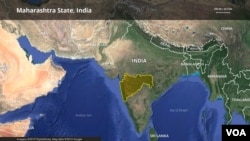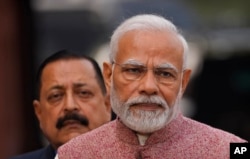The alleged killing in India’s western Maharashtra state of a journalist who had highlighted local opposition to a huge oil refinery proposed in a rural district has raised concerns about intimidation of journalists and demands for an investigation into his death.
Shashikant Warishe died on Tuesday, a day after he was hit by a vehicle allegedly being driven by a land dealer about whom he had written an article in a Marathi language newspaper, Mahanagari Times. The incident took place in Ratnagiri district.
The journalist had accused land dealer, Pandharinath Amberkar, involvement in illegal land grabs in villages in Ratnagiri where the refinery is slated for development, and of threatening local residents opposed to its construction.
In the article, Warishe questioned why Amberkar, who was known to support the refinery’s construction, was publicizing photos of himself with Prime Minister Narendra Modi and top Maharashtra leaders on posters.
Amberkar has been arrested and is being charged with murder, according to a police official.
“Prima facie evidence too pointed to Amberkar’s intention to kill,” Ratnagiri Police Superintendent Dhananjay Kulkarni told reporters Wednesday.
“The murder in broad daylight on the same day that he published an article about the person who was allegedly driving the vehicle that rammed into him is very disturbing,” Narendra Wable, the president of the Mumbai Marathi Patrakar Sangh, the Mumbai Marathi Journalists Association, told VOA Thursday.
In recent months, 48-year-old Warishe had written a series of articles on why villagers were resisting development of the refinery in the coastal, predominantly rural district. The project was stalled for years, but the state government has said it will be revived.
Some villagers worried that waste discharged from the refinery would hurt fishing and the lush mango cultivation, for which the region is famous, resulting in loss of livelihoods.
They were also concerned about land surveys in the area, fearful that their land might be acquired. Land acquisition poses a major hurdle to large projects in India as people are reluctant to part with their land.
“Warishe used to be the voice of the people, articulating their concerns” Sadshiv Kerkar, Mahanagari Times editor in chief told VOA this week.
“He was very well-respected for the work he did and I never imagined that it would make him a target. This is obviously meant to intimidate all those who oppose the project,” he said.
Warishe had worked for the newspaper for about a decade. India has a vibrant regional language media.
Journalists have expressed concerns that the incident would have a chilling impact on reporters.
In a statement Wednesday, the Mumbai Press Club said the "brutal, public murder" brought to light the "plummeting standards of civil liberties and free speech and brazen attempt by both state and non-state players to crush any media reporting that proves to be inconvenient."
Maharashtra media are demanding a probe into incident and have urged the government to “ensure speedy justice.” Journalists in the state wore black armbands Friday in a symbolic protest.
“We want the case to be tried in a fast-track court,” Wable said. In India’s slow-moving justice system, cases usually take years to be decided.
The Committee To Protect Journalists has also called on Indian authorities to “thoroughly investigate” all those involved in the killing and ensure they are brought to justice.
“The Maharashtra government must take steps to protect all journalists working in the state and seek accountability for those attacked or killed,” said Beh Lih Yi, CPJ’s Asia program coordinator.





